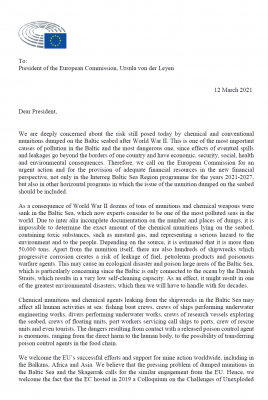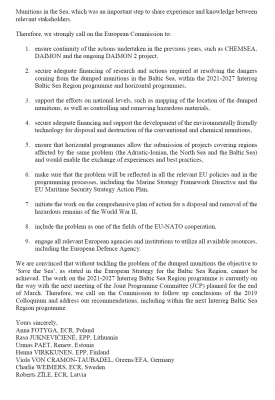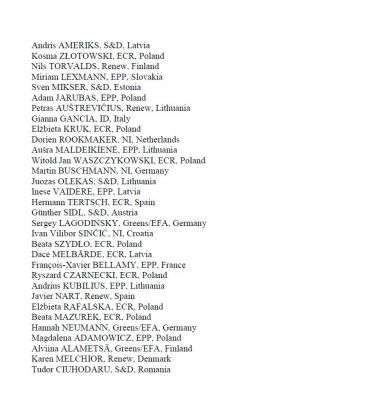MEPs call on the European Commission to take urgent actions to neutralise and eliminate unexploded ordnance and chemical weapons from the Baltic bottom
On 12th March 2021, on the initiative of Anna Fotyga, 39 MEPs from 15 Member States and six political groups sent a letter to the European Commission calling to take urgent actions to neutralise and eliminate unexploded ordnance and chemical weapons from the Second World War.
"We express our deep concern about the threat that is still posed by chemical and conventional weapons sunk in the Baltic Sea after World War 2. It is one of the main causes of pollution in the Baltic Sea, and one of the most dangerous, as the effects of corrosion and leaks go beyond the borders of one country, threaten health and security, with economic, social, health and environmental consequences. Therefore, we call upon the European Commission to take urgent action and provide adequate financial resources in the new financial perspective”. – we read in the letter addressed to the President of the European Commission, Ursula von der Leyen.
In the letter, the MEPs call upon the European Commission to:
1. Ensure the continuity of the actions undertaken in the previous years, such as CHEMSEA, DAIMON and the ongoing DAIMON 2 project;
2. Secure adequate financing of research and actions required at resolving the dangers coming from the dumped munition in the Baltic Sea, within the Interreg Baltic Sea Region programme 2021-2027 and horizontal programmes;
3. Support the efforts at national levels, such as mapping of the location of the dumped munition, as well as controlling and removing hazardous substances;
4. Secure adequate financing and support the development of the environmentally friendly technology for disposal and destruction of conventional and chemical munition;
5. Ensure that horizontal programmes allow the submission of projects covering regions affected by the same problem (the Adriatic-Ionian Sea, the North Sea and the Baltic Sea) and would enable the exchange of experiences and best practices;
6. Make sure that the problem will be reflected in all the relevant EU policies and in the programming processes, including the Marine Strategy Framework Directive and the EU Maritime Security Strategy Action Plan;
7. Initiate the work on a comprehensive action plan for a disposal and removal of the hazardous remains of the Second World War;
8. Include the problem as one of the fields of the EU – NATO cooperation;
9. Engage all relevant European agencies and institutions to utilise all available resources, including the European Defence Agency.
The letter also mentions the fuel deposited on the wrecks (this threat should be treated separately from chemical and conventional weapons, because the problem of potential fuel leakage and cleaning of shipwrecks requires different technological solutions that the problem of dumped munition. This fact is not adequately highlighted in the letter of the MEPs).
”Apart from the munition itself, there are also hundreds of shipwrecks which progressive corrosion creates the risk of fuel leakage, leakage of petroleum products and poisonous welfare agents. This may cause an ecological disaster and pollute large areas of the Baltic Sea, a fact of particular concern, because the Baltic is connected to the ocean by the Danish Straits, which results in a very low self-cleaning capacity. As an effect, it may result in one of the greatest environmental disasters which we will have to handle for decades”.
The nine measures proposed in the letter do not clearly what steps should be taken to prevent the risk of fuel spills. The main problem is financing and the lack of responsibility from the government in Poland.
Full text of the letter:
There is no doubt this call to engage the European Union is an important step forward, also taking into account the last meeting of the Parliamentary Committee on Maritime Economy and Inland Navigation (23rd February 2021). It is clear from the meeting that no Polish ministry feels responsible for the dangerous materials lying at the bottom of the Baltic Sea, and the law does not specify who should deal with this topic.




